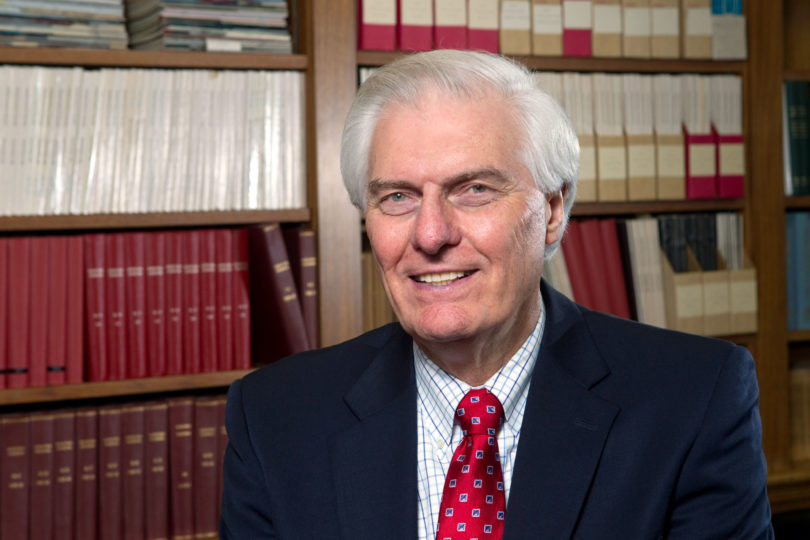The board of regents approved five new degree programs at UGA late last year. Columns talked to Dale Threadgill, Faculty of Engineering director, about the degrees and what they mean for the university.
Columns: What are the new degrees that were recently approved by the board of regents?
Threadgill: The board of regents approved three new bachelor of science degrees in biochemical engineering, computer systems engineering and environmental engineering, respectively. Master of science degrees were also approved for biochemical engineering and environmental engineering.
Columns: Why did the university seek to add these degrees now?
Threadgill: Faculty and administrators recognized the need to leverage our research strengths as a way of increasing external funding and providing service to the state in an innovative, dynamic way.
Columns: And these were the best new engineering directions for UGA?
Threadgill: In symposia during 2000 and 2001, we received input from deans and department heads around campus as well as those of other institutions and advisers from government and industry. The idea of comprehensive engineering began to take shape as a way to synergize what we do best at UGA with some emerging areas in science and engineering. By expanding our research enterprise, we produce a greater return for the state’s investment in the university system. These new degrees grew out of program areas identified in those symposia.
Columns: Why does UGA need comprehensive engineering?
Threadgill: Precisely because of all of our past investment in biological sciences, in computer science, in environmental design, in imaging, in building our nanotechnology -capabilities. To take advantage of the opportunities these investments have created for our faculty, they need to be able to functionalize and find applications for their research, and engineering expertise is the key to that effort.
Columns: But aren’t degrees aimed primarily at students?
Threadgill: Degree programs are essential to a top tier research program and vice versa. The best students and the best faculty are both attracted by opportunity. Part of what we’re doing is engineering the UGA way and offering our students the opportunity to learn in a collaborative, interdisciplinary environment will only increase the appeal of our programs. Our current engineering grads already have a sterling reputation for well-roundedness and innovative thinking; we want to broaden this pool by creating wider opportunities for more engineering students and, by implication, greater access to engineering education for the citizens of Georgia.
Columns: Doesn’t the state of Georgia already have an engineering school?
Threadgill: It does and a very highly regarded one. The land-grant mission remains our focus and it’s crucial for Georgia that engineering in our state evolve in the liberal arts environment of UGA, along with business, law, journalism, pharmacy and the hard sciences. This is a unique approach, specifically tailored to UGA.
Columns: Will these new programs mean new faculty, new buildings?
Threadgill: Because the degrees are just one step in the process of creating comprehensive engineering, we’re already well along the path. The Faculty of Engineering, a university-wide academic unit, was created in 2001 to allow faculty from across campus to contribute to engineering and advance their teaching and research. Joint–appointments have been hired and new faculty lines have been identified; we have also made strategic investments in new lab facilities in existing buildings. All of these will work in concert as the new degrees come on line to expand our research and instruction capacities and thereby enhance extramural funding as we build a responsive, innovative engineering program.
Columns: So, UGA is expanding engineering to bring in more -funding?
Threadgill: That’s one perspective, but take a case in point: the UGA biorefinery. This is a multidimensional project to find answers to some our state’s most pressing problems—environmental degradation, economic development and renewable energy. What one entity could bring together these various issues, let alone provide a track by which they can be simultaneously and effectively pursued? Using work from chemistry and nanotechnology, UGA engineering will demonstrate their fuel cell using hydrogen from biomass while soil scientists test the char byproduct as a soil amendment fertilizer, all of which add value to Georgia’s vast forests. So we want to create synergy among the many things UGA already does well and expand our capacity for doing this; one result will be increased extramural funding.
Columns: When will students be able to enroll in environmental engineering classes?
Threadgill: They can start right now by preparing with the necessary math and science prerequisites. Environmental engineering is already an area of emphasis in our existing program and faculty from the Institute of Ecology and the School of Environment and Design are working with engineering colleagues to design new courses further integrating these disciplines.
Columns: Anything to add?
Threadgill: Just to commend all those from every level of the university for this effort and prepare them for the work that lies ahead. As Georgia’s flagship institution, we must be able to anticipate the needs of the state and work to its every advantage. These degrees reflect planning and passion towards those ends from President Adams on down and they reaffirm our commitment to the citizens of Georgia.








